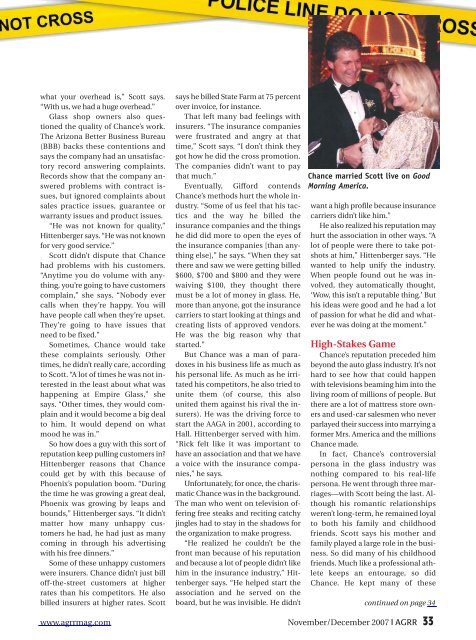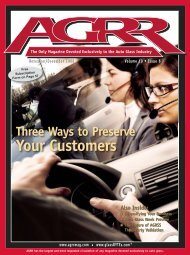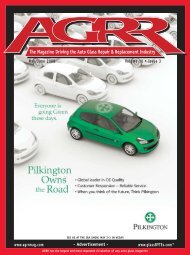AGRR - November/December 2007 - AGRR Magazine
AGRR - November/December 2007 - AGRR Magazine
AGRR - November/December 2007 - AGRR Magazine
You also want an ePaper? Increase the reach of your titles
YUMPU automatically turns print PDFs into web optimized ePapers that Google loves.
what your overhead is,” Scott says.“With us, we had a huge overhead.”Glass shop owners also questionedthe quality of Chance’s work.The Arizona Better Business Bureau(BBB) backs these contentions andsays the company had an unsatisfactoryrecord answering complaints.Records show that the company answeredproblems with contract issues,but ignored complaints aboutsales practice issues, guarantee orwarranty issues and product issues.“He was not known for quality,”Hittenberger says. “He was not knownfor very good service.”Scott didn’t dispute that Chancehad problems with his customers.“Anytime you do volume with anything,you’re going to have customerscomplain,” she says. “Nobody evercalls when they’re happy. You willhave people call when they’re upset.They’re going to have issues thatneed to be fixed.”Sometimes, Chance would takethese complaints seriously. Othertimes, he didn’t really care, accordingto Scott. “A lot of times he was not interestedin the least about what washappening at Empire Glass,” shesays. “Other times, they would complainand it would become a big dealto him. It would depend on whatmood he was in.”So how does a guy with this sort ofreputation keep pulling customers in?Hittenberger reasons that Chancecould get by with this because ofPhoenix’s population boom. “Duringthe time he was growing a great deal,Phoenix was growing by leaps andbounds,” Hittenberger says. “It didn’tmatter how many unhappy customershe had, he had just as manycoming in through his advertisingwith his free dinners.”Some of these unhappy customerswere insurers. Chance didn’t just billoff-the-street customers at higherrates than his competitors. He alsobilled insurers at higher rates. Scottsays he billed State Farm at 75 percentover invoice, for instance.That left many bad feelings withinsurers. “The insurance companieswere frustrated and angry at thattime,” Scott says. “I don’t think theygot how he did the cross promotion.The companies didn’t want to paythat much.”Eventually, Gifford contendsChance’s methods hurt the whole industry.“Some of us feel that his tacticsand the way he billed theinsurance companies and the thingshe did did more to open the eyes ofthe insurance companies [than anythingelse],” he says. “When they satthere and saw we were getting billed$600, $700 and $800 and they werewaiving $100, they thought theremust be a lot of money in glass. He,more than anyone, got the insurancecarriers to start looking at things andcreating lists of approved vendors.He was the big reason why thatstarted.”But Chance was a man of paradoxesin his business life as much ashis personal life. As much as he irritatedhis competitors, he also tried tounite them (of course, this alsounited them against his rival the insurers).He was the driving force tostart the AAGA in 2001, according toHall. Hittenberger served with him.“Rick felt like it was important tohave an association and that we havea voice with the insurance companies,”he says.Unfortunately, for once, the charismaticChance was in the background.The man who went on television offeringfree steaks and reciting catchyjingles had to stay in the shadows forthe organization to make progress.“He realized he couldn’t be thefront man because of his reputationand because a lot of people didn’t likehim in the insurance industry,” Hittenbergersays. “He helped start theassociation and he served on theboard, but he was invisible. He didn’tChance married Scott live on GoodMorning America.want a high profile because insurancecarriers didn’t like him.”He also realized his reputation mayhurt the association in other ways. “Alot of people were there to take potshotsat him,” Hittenberger says. “Hewanted to help unify the industry.When people found out he was involved,they automatically thought,‘Wow, this isn’t a reputable thing.’ Buthis ideas were good and he had a lotof passion for what he did and whateverhe was doing at the moment.”High-Stakes GameChance’s reputation preceded himbeyond the auto glass industry. It’s nothard to see how that could happenwith televisions beaming him into theliving room of millions of people. Butthere are a lot of mattress store ownersand used-car salesmen who neverparlayed their success into marrying aformer Mrs. America and the millionsChance made.In fact, Chance’s controversialpersona in the glass industry wasnothing compared to his real-lifepersona. He went through three marriages—withScott being the last. Althoughhis romantic relationshipsweren’t long-term, he remained loyalto both his family and childhoodfriends. Scott says his mother andfamily played a large role in the business.So did many of his childhoodfriends. Much like a professional athletekeeps an entourage, so didChance. He kept many of thesecontinued on page 34www.agrrmag.com <strong>November</strong>/<strong>December</strong> <strong>2007</strong> <strong>AGRR</strong> 33





